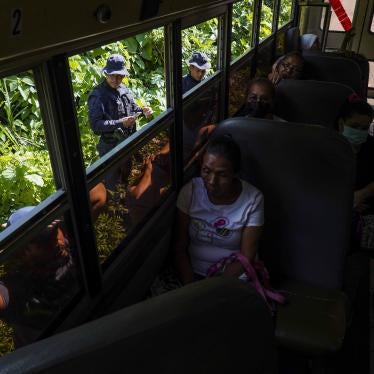The Pentagon, seemingly all too aware of what a debacle its military commissions have been, has come with a new tactic to prevent groups like mine, Human Rights Watch, from doing our jobs as watchdogs: Restrict our access to the press and handpick a new crop of observers.
Starting with the first military commission hearing in August 2004, Human Rights Watch -- along with four other NGOs -- were granted observer status. Since then, we have attended every hearing, offering explanations, observations, and analysis to the public and members of the media covering the commissions.
But before each trip down, we, as NGO observers, are given two documents to sign -- a set of ground rules and a promise not to sue. If I don't sign, I don't go.
Yesterday, I headed to Guantanamo to attend Thursday's hearing for Omar Khadr, the Canadian who was only 15 at the time he was taken into US custody. This time around the ground rules came with two new clauses.
Clause number one extracts a commitment not to "request or pressure" our military escorts to take us to or near the press rooms. This is where members of media watch the hearings on video feed, write their stories, and conduct interviews.
Clause number two makes clear that we are not entitled to attend the press conferences, and that we are not -- under any circumstances -- allowed into the press rooms where the media work.
If we violate either of these rules, we can lose our observer status -- forever.
All of this might be reasonable if we were in a normal setting. But we're not. We're talking about Guantanamo. Cell phones don't work. Email access is spotty at best. And our movement is controlled by military handlers who dictate our daily activities. We are housed on the "leeward" side of the base -- a boat ride from the Cuban mainland where the detainees are imprisoned and the military commissions take place. Once we cross over, we are not allowed to take a step without them.
If we can't even request to be taken to the areas where the media congregate, are barred from the DOD press conference, and categorically prohibited access to the press room, we can't be reached, we can't offer commentary, and we can't give interviews. Or at least we can't do so in a timely manner to make the news cycle -- all of which undermines our work here.
And the Pentagon knows this. They don't want us in the news.
Not so with the newly-invited NGO observers. When I arrived at Andrews Air Force base this morning to catch my flight to Guantanamo, I learned that three other observers would be joining our gang of five -- from Heritage Foundation, Veterans for Foreign Wars, and the Carnegie Council. Never mind that NYU's Brennan Center and other groups have been clamoring for observer status for years. The Pentagon reached out to these guys and asked them to attend.
Within moments after arrival at Andrews Air Force Base, I was -- in accordance with the same fear of NGO media contamination that appears to underlie the new ground rules -- told I would not be allowed on the plane with the media. Instead, I was to fly with the military commission staff. The new invitees, on the other hand, flew with the journalists.
As of now (since our arrival in Guantanamo) we are all being treated equal. We're being handled by the same military escort and subject to the same inane rules.
Five of us are huddled around a small table, shoulders touching, cable cords strung out underneath the media room door at the headquarters where we all stay -- the only way we can get internet access. The glass window in the press room door is covered with a white sheet so we can't signal to the media with our eyes. And a sign is posted in big block letters: "Authorized Personnel Only -- JTF/Media."
When one of the new invites asked whether we could join the media tour of the base tomorrow, he received a resounding 'no.' "Our job is to keep you separate from the media."
All of this is a bit silly. Press have been told to keep closed the door from the press room to the outside, so as to avoid a mosquito infestation in their nicely air conditioned, water-stocked room. Their only way out is through our anteroom, which some journalist walks past every few minutes, jarring our table and jeopardizing our carefully placed cables.
And while I have no doubt that our military handlers will do everything in their power to keep us away from the media at the conclusion of Thursday's commissions hearing, we will find a way to make our observations known -- even if it means calling our stateside offices, dictating our observations, and asking them to email them to the interested members of the press.
There is simply no good reason for all of us to have to go through all of this just to do our job. Rather, it seems just one more example of the administration's ingenious attempt at spin. Claim that the trials are transparent, fair, and open. Invite them down. Let them talk. But only a little.






